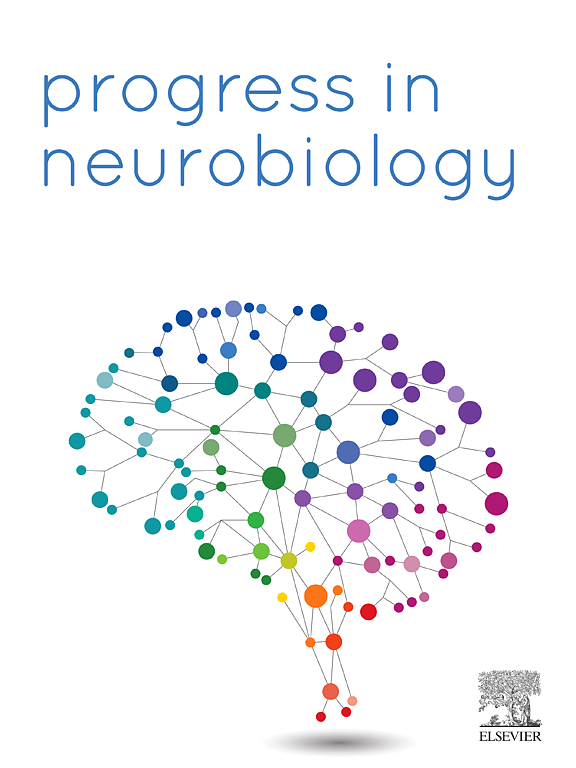Tcf4缺乏导致小鼠复发性癫痫发作
IF 6.1
2区 医学
Q1 NEUROSCIENCES
引用次数: 0
摘要
转录因子4 (TCF4)对中枢神经系统的正常发育和功能至关重要。由于TCF4缺失或突变导致的单倍性缺陷会导致皮特-霍普金斯综合征(PTHS),这是一种以癫痫发作、自闭症和智力残疾为特征的终身神经发育障碍。先前的研究表明,各种突变,包括神经祖细胞、神经元或少突胶质细胞中小鼠Tcf4基因外显子4的缺失,不会重现癫痫表型。在这里,我们报告了在醛脱氢酶1家族成员L1 (Aldh1l1)表达细胞中杂合缺失Tcf4的小鼠——导致星形胶质细胞中Tcf4表达减少约60%,其他细胞类型(包括神经元和少突胶质细胞)中Tcf4表达减少35%——早在出生后第4天就出现了星形胶质细胞增生,随后在3个月或更晚开始出现严重的复发性癫痫发作,并表现出寿命缩短。此外,这些小鼠在成年期表现出皮层、海马体、杏仁核和下丘脑的神经元活动增加。此外,单核RNA测序显示,与野生型对照相比,PTHS小鼠模型中兴奋性神经元、抑制性神经元、星形胶质细胞和少突胶质细胞中广泛存在的基因表达变化,包括与癫痫相关的基因。总的来说,这是首次报道PTHS小鼠模型出现癫痫发作,为研究PTHS发病机制和开发PTHS及其相关癫痫的治疗方法提供了有价值的工具。本文章由计算机程序翻译,如有差异,请以英文原文为准。
Tcf4 Deficiency causes recurrent seizures in mice
Transcription factor 4 (TCF4) is essential for the normal development and function of the central nervous system. Haploinsufficiency of TCF4 due to deletions or mutations causes Pitt-Hopkins Syndrome (PTHS), a lifelong neurodevelopmental disorder characterized by seizures, autism, and intellectual disability. Previous studies have shown that various mutations, including deletion of exon 4 in the mouse Tcf4 gene in neural progenitors, neurons, or oligodendrocytes, did not reproduce the seizure phenotype. Here, we report that mice with a heterozygous deletion of Tcf4 in Aldehyde Dehydrogenase 1 Family Member L1 (Aldh1l1)-expressing cells—which resulted in approximately 60 % reduced Tcf4 expression in astrocytes and a 35 % reduction in other cell types, including neurons and oligodendrocytes—developed astrogliosis as early as postnatal day 4, followed by severe recurrent seizures beginning at three months of age or later, and exhibited shortened lifespans. Additionally, these mice showed increased neuronal activity in the cortex, hippocampus, amygdala, and hypothalamus in adulthood. Furthermore, single-nucleus RNA sequencing revealed widespread gene expression changes, including genes associated with epilepsy, in excitatory neurons, inhibitory neurons, astrocytes, and oligodendrocytes in our PTHS mouse model compared to wild-type controls. Overall, this is the first report of a PTHS mouse model exhibiting seizures, providing a valuable tool to investigate the mechanisms underlying PTHS pathogenesis and to develop therapies for PTHS and its associated epilepsy.
求助全文
通过发布文献求助,成功后即可免费获取论文全文。
去求助
来源期刊

Progress in Neurobiology
医学-神经科学
CiteScore
12.80
自引率
1.50%
发文量
107
审稿时长
33 days
期刊介绍:
Progress in Neurobiology is an international journal that publishes groundbreaking original research, comprehensive review articles and opinion pieces written by leading researchers. The journal welcomes contributions from the broad field of neuroscience that apply neurophysiological, biochemical, pharmacological, molecular biological, anatomical, computational and behavioral analyses to problems of molecular, cellular, developmental, systems, and clinical neuroscience.
 求助内容:
求助内容: 应助结果提醒方式:
应助结果提醒方式:


